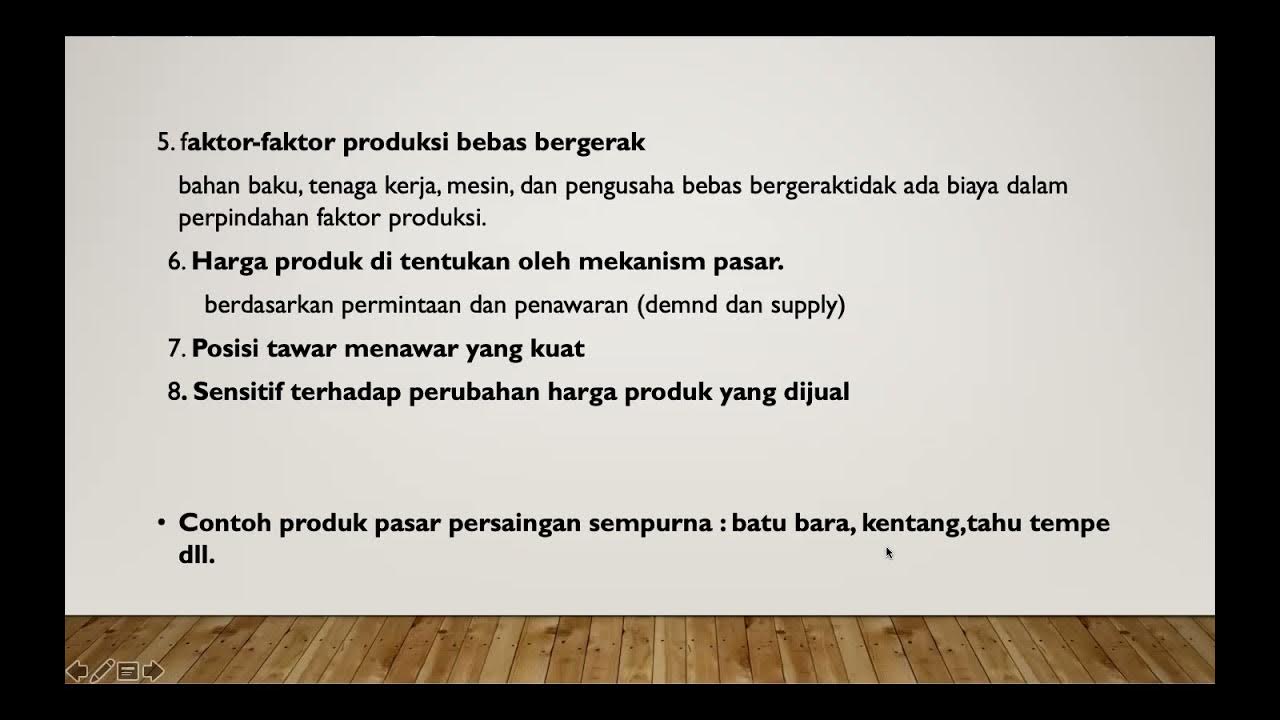Struktur Pasar (Pasar Persaingan Sempurna, Monopoli, Oligopoli, Monopolistik)
Summary
TLDRThis video script explores the concept of market structures in economics, explaining four key types: perfect competition, monopoly, oligopoly, and monopolistic competition. Each structure is broken down by characteristics, including the number of sellers, product differentiation, pricing mechanisms, and entry barriers. The script emphasizes how each market impacts both producers and consumers, discussing the advantages and disadvantages of each structure. It also compares price-taker and price-maker roles, offering real-world examples to highlight key concepts and their implications on innovation, pricing, and consumer choice.
Takeaways
- 😀 The structure of markets can vary significantly, with different types such as perfect competition, monopolistic competition, oligopoly, and monopoly, each affecting market behavior.
- 😀 In **perfect competition**, there are many sellers, homogeneous products, and consumers have perfect information. Prices are determined by supply and demand, with no individual seller able to control prices (price takers).
- 😀 **Monopolistic competition** involves many sellers offering differentiated products. While firms have some control over pricing, they face competition, and innovation is driven by differentiation.
- 😀 **Oligopoly** is characterized by a few firms dominating the market. These firms have some control over prices (price makers) and often engage in strategic behavior, such as collusion or price leadership.
- 😀 **Monopoly** occurs when there is only one producer or seller in the market, resulting in price control and high barriers to entry. Monopolists are price makers and often have significant market power.
- 😀 Advertising plays a crucial role in monopolistic competition, where firms use it to differentiate their products and persuade consumers to choose them over competitors.
- 😀 Innovation is encouraged in monopolistic competition because firms must constantly differentiate their products to maintain market share. This benefits consumers by offering more choices.
- 😀 A key disadvantage of monopolistic competition is the higher costs of advertising and marketing, which can lead to increased consumer prices and less price competition.
- 😀 The **price taker** vs. **price maker** distinction is important: price takers are in perfect competition and monopolistic competition, while price makers are in oligopolies and monopolies.
- 😀 A competitive market structure leads to better consumer welfare, as prices are typically lower and products are more efficient, but may limit product innovation in the case of perfect competition.
Q & A
What is the key characteristic of a perfectly competitive market?
-In a perfectly competitive market, there are many sellers and buyers, with homogeneous products. All participants are price takers, meaning they have no control over the prices, which are determined by market forces.
How does monopolistic competition differ from perfect competition?
-Monopolistic competition also involves many sellers, but the products are differentiated rather than homogeneous. Unlike perfect competition, sellers in monopolistic competition are price makers to some extent, and they compete through product differentiation and marketing.
What are the advantages of monopolistic competition for consumers?
-Consumers benefit from monopolistic competition because it encourages product innovation and offers a variety of choices. It also leads to better customer service as companies strive to improve their image and differentiate themselves.
What is a significant disadvantage of monopolistic competition?
-A major disadvantage of monopolistic competition is the high marketing costs incurred by companies to differentiate their products. This often leads to increased prices and more aggressive price competition.
What is the primary difference between oligopoly and monopoly?
-The primary difference is the number of sellers. In a monopoly, there is only one seller with total control over the market, while in an oligopoly, a few large sellers dominate the market, and there is potential for collaboration or collusion between them.
What are some common industries where an oligopoly structure is found?
-Oligopolistic markets are typically seen in industries such as automobile manufacturing, telecommunications, and technology, where a few large firms control the majority of the market share.
How does innovation impact the monopolistic competition market structure?
-In monopolistic competition, the need to differentiate products encourages companies to invest in innovation. This leads to a continuous cycle of new features, designs, and improved services, benefiting consumers with more options and better products.
Why is advertising particularly important in a monopolistic competition market?
-Advertising is crucial in monopolistic competition because it helps businesses differentiate their products from competitors. Since products are similar but not identical, advertising plays a key role in attracting customers and establishing brand loyalty.
What is the role of barriers to entry in the different market structures?
-Barriers to entry vary across market structures. In perfect competition and monopolistic competition, barriers to entry are low, encouraging new firms to enter the market. In oligopoly and monopoly, barriers to entry are higher, making it difficult for new competitors to emerge.
What is the impact of monopolistic competition on pricing strategies?
-In monopolistic competition, firms have some control over prices due to product differentiation. This results in competitive pricing but also means that firms may engage in non-price competition, such as marketing, to attract customers and maintain market share.
Outlines

此内容仅限付费用户访问。 请升级后访问。
立即升级Mindmap

此内容仅限付费用户访问。 请升级后访问。
立即升级Keywords

此内容仅限付费用户访问。 请升级后访问。
立即升级Highlights

此内容仅限付费用户访问。 请升级后访问。
立即升级Transcripts

此内容仅限付费用户访问。 请升级后访问。
立即升级5.0 / 5 (0 votes)






